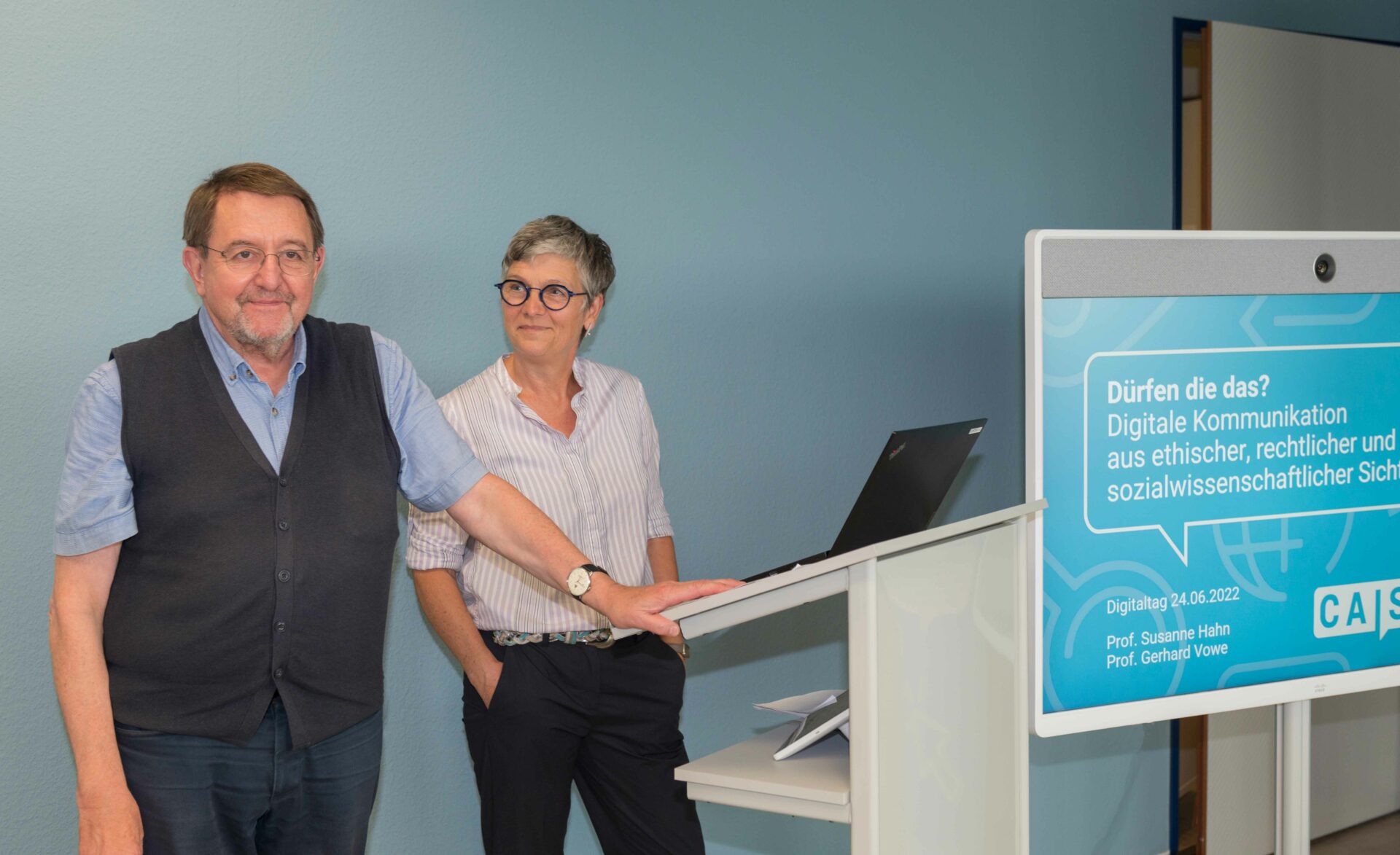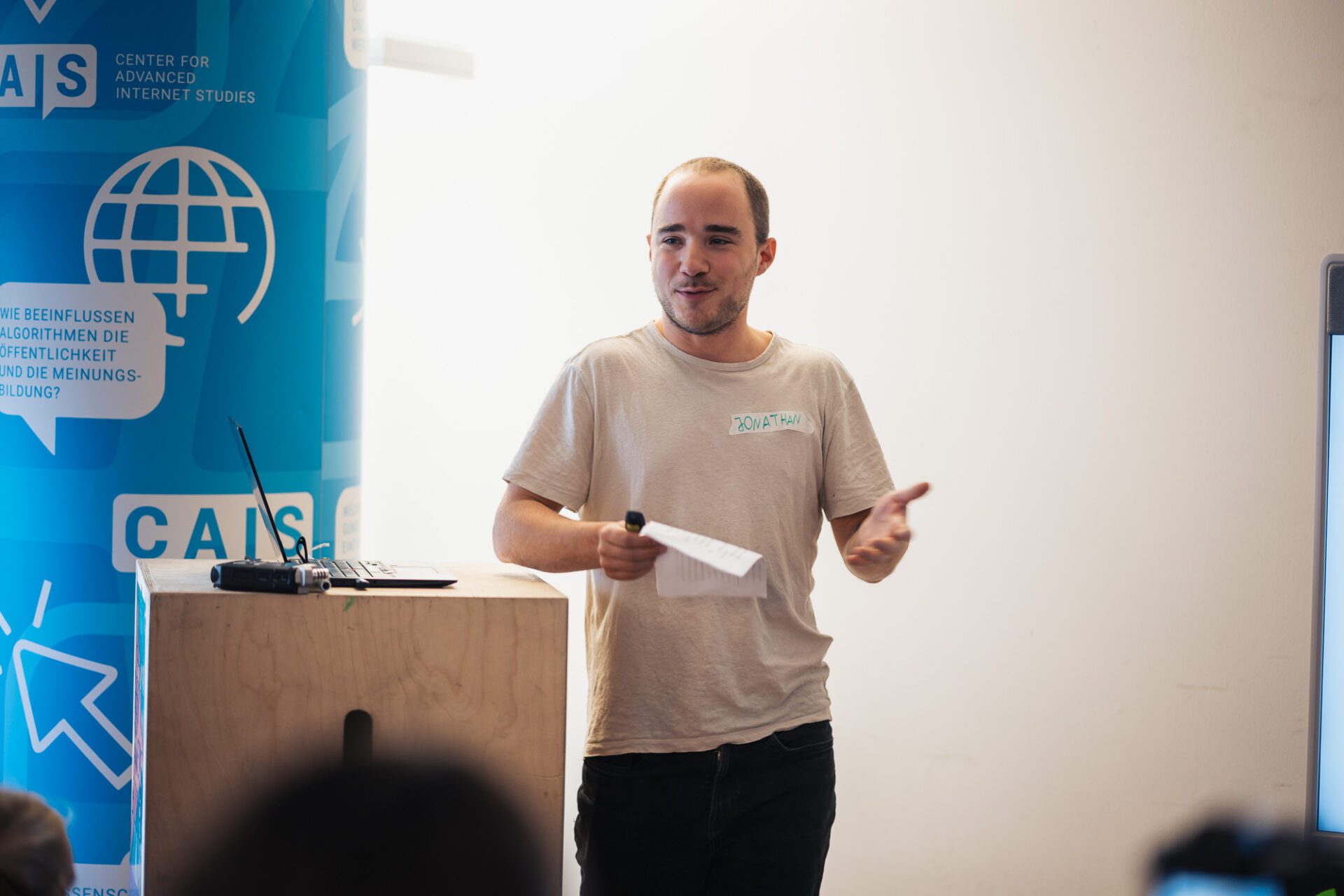ELSI – Ethical, Legal and Social Issues

Digitization processes are changing the way individuals live their lives and interact on a day-to-day basis, the collective reconciliation of interests, the formation of political will and public communication. These changes offer opportunities, but also harbor risks for individuals, groups and entire societies.

Our research focuses on the question of which goals, norms and principles can be used and translated into legal regulations to create a legitimate and accepted framework for a digitized living environment in the interest of people, which can be shaped by the actors living in it.
News
Philosophical-ethical expertise
The digital transformation challenges habits and practices. Individual lifestyles, collective balancing of interests, political decision-making and public communication are all equally affected. Artificial intelligence also puts human self-understanding to the test.
Ethical – and even more generally – philosophical reflection makes specific contributions to thinking about life in digital worlds: Establishing larger contexts, hypothetical thinking, conceptual clarification, as well as thinking about norms are some features that are inherent to philosophy.
We want to make this expertise easier to find and have compiled a list of philosophical experts (mostly from German-speaking countries). Their fields of work can be found in the keywords given to us by the experts themselves.
Please contact the experts directly via the respective e-mail address.
The project was initiated by Prof. Dr. Susanne Hahn as part of the “Digital Ethics” project funded by the Mercator Foundation.
Contact
Dr. Nina Hahne
- Bormann, M., Tranow, U., Vowe, G. & Ziegele, M. (2021). Incivility as a Violation of Communication Norms — A Typology Based on Normative Expectations toward Political Communication. Communication Theory. https://doi.org/10.1093/ct/qtab018
- Datts, M., Wiederholz, J.-E., Schultze, M. & Vowe, G. (2021). Political Communication Patterns of Young Adults in Germany. Frontiers in Communication. https://doi.org/10.3389/fcomm.2021.729519
- Dietrich, Frank & Seim, Jonathan (2021). Kommunale Online-Partizipation – Wer ist gefragt? Zeitschrift für Praktische Philosophie, 8(1), S. 279–306.
- Dohle, M., Kelm, O., Bormann, M. & Vowe, G. (2022). How Do News Media for Children and Adolescents Differ from Those for Adults? A Content Analysis of German Reporting on Migration and Refugees. Journalism Practice, 1-19. https://doi.org/10.1080/17512786.2022.2104744.
- Döring, N., Krämer, N., Mikhailova, V., Brand, M., Krüger, T. H. C. & Vowe, G. (2021). Sexual Interaction in Digital Contexts and Its Implications for Sexual Health: A Conceptual Analysis. Frontiers in Psychology, 12, 769732. https://doi.org/10.3389/fpsyg.2021.769732.
- Hahn, S. (in press). Verantwortung in Zeiten >künstlicher Intelligenz<. Eine Problemexposition am Beispiel medizinischer Diagnostik. In M. Kettner, S. Hahn, R. Adolphi & S. Alpsancar (Eds.). Philosophische Digitalisierungsforschung (I). Verständigung, Verantwortung, Vernunft. Darmstadt: Wissenschaftliche Buchgemeinschaft.
- Hahn, S. (2021). Bullshit in Science? – On Epistemic Norms, Credibility and the Role of Science in Society, in: Jan G. Michel (ed.), Making Scientific Discoveries. Interdisciplinary Reflections, Leiden/Münster. 217-231. doi:10.30965/9783957437044_013
- Kelm, O., Dohle, M. & Vowe, G. (2021). Diskussion der Ergebnisse aus kommunikationswissenschaftlicher Perspektive. In N. Brüggen, M. Dohle, O. Kelm & E. Müller (Hrsg.), Flucht als Krise? Flucht, Migration und Integration in den Medien sowie die themenbezogene Aneignung durch Heranwachsende (S. 305-311). München: kopaed. https://doi.org/10.5281/zenodo.4741046
- Klimmt, C., Dittrich, A., Brosius, HB., Schmid-Petri, H., Schultz, T. & Vowe, G. (2022). Herkunftsnennung von Täter*innen und Verdächtigen in der Verbrechensberichterstattung: Eine Handreichung zur Reflexion für Journalist*innen und Kommunikationsverantwortliche der Sicherheitsbehörden und der Justiz. Publizistik. https://link.springer.com/article/10.1007/s11616-022-00765-5
- Maurer, M., Jandura, O. & Vowe, G. (2023). Wie wir ohne Panik aus dem brennenden Haus kommen: Konstruktiver Klimajournalismus mindert Angst und Resignation. In J. Wolling, M. Becker & C. Schumann (Hrsg.), Klima(wandel)kommunikation: Im Spannungsfeld von Wissenschaft, Medien und öffentlicher Meinung (S. 167-185). Ilmenau: Universitätsverlag Ilmenau.
- Meißner, F., Weinmann, C. & Vowe, G. (2022). Understanding and Addressing Problems in Research Collaboration: A Qualitative Interview Study From a Self-Governance Perspective. Frontiers in Research Metrics and Analytics, 6, 778176. https://doi.org/10.3389/frma.2021.778176
- Vowe, G. (2022). Struktureller Wandel der politischen Kommunikation: Chancen und Risiken für liberale Demokratien. MIP Zeitschrift für Parteienwissenschaft, 3, 187-213. https://doi.org/10.24338/mip-2022187-213
- Weinmann, C., Hückstädt, M., Meißner, F., & Vowe, G. (2023). How do researchers perceive problems in research collaboration? Results from a large-scale survey among German scientists. Frontiers in Research Metrics and Analytics, 8, 1-13.
- Ruschemeier, H. (2021). Künstliche Intelligenz als Instrument des Umweltschutzes. Zur rechtlichen Bewertung der Umweltwirkungen intelligenter Technologien (mit Mario Martini), in: ZUR 10/2021, 515-532 (i.E.).
- Seim, J. (2022). Repräsentativität oder Diversität? Eine Evaluation der Teilnehmendenschaft des Online-Beteiligungsverfahrens #meinfernsehen2021. In F. Gerlach & C. Eilders (Hrsg.). #meinfernsehen 2021. Bürgerbeteiligung: Wahrnehmungen, Erwartungen und Vorschläge zur Zukunft öffentlich-rechtlicher Medienangebote (S. 267-286). Baden-Baden: Nomos.
- Seim, Jonathan (2022). Der Demos deliberativer Bürger:innenbeteiligung. Zur legitimitätstheoretischen Bedeutung formaler Unverbindlichkeit. In D. Daszko, S. Nienhaus, H. Vogel und V. Warnken (Hrsg.). Deliberation, politischer Wettbewerb und politische Berichterstattung. Aktuelle Phänomene und Perspektiven politischer Kommunikation (S. 3-21). Düren: Shaker Verlag.
- Seim, J. (2021). Der Wert politischer Partizipation. Ein Überblick. In: F. Bätge, K. Effing, K. Möltgen-Sicking und T. Winter (Hg.): Politische Partizipation. Wiesbaden: Springer Fachmedien Wiesbaden, S. 95–111.
- Vowe, G. (im Druck). Struktureller Wandel der politischen Kommunikation: Chancen und Risiken für liberale Demokratien. MIP Zeitschrift für Parteienwissenschaft, 28(4).
- Vowe, G. (2021). Wie verändert sich die politische Kommunikation in der Online-Welt? Sieben Tendenzen des strukturellen Wandels der Öffentlichkeit. In D. Schütz, R. Kollmorgen & S. Schäller (Hrsg.), Die neue Mitte? Ideologie und Praxis der populistischen und extremen Rechten (S. 309-320). Köln: Böhlau Verlag. https://www.vandenhoeck-ruprecht-verlage.com/themen-entdecken/sozial-rechts-und-wirtschaftswissenschaften/politikwissenschaft/56594/die-neue-mitte
- Vowe, G. (2021). Politikbegriffe. In M. Prinzing & R. Blum (Hrsg.), Handbuch Politischer Journalismus (S. 151-155). Köln: Herbert von Halem. https://www.halem-verlag.de/handbuch-politischer-journalismus/
- Vowe, G. (2021). Wie digitalisiert war der Bundestagswahlkampf 2021? Zwölf Thesen. MIP Zeitschrift für Parteienwissenschaft, 27(2), 215-229. https://doi.org/10.24338/mip-2021215-229
- Vowe, G. (2021). Blick und Griff. Wie Uwe Hasebrink die Kommunikationswissenschaft prägt. In Leibniz-Institut für Medienforschung (Hrsg.), Medienumgebungen. Auf den Spuren von Uwe Hasebrink (S. 10-11). Hamburg: Verlag Hans-Bredow-Institut. https://leibniz-hbi.de/uploads/media/default/cms/media/af6dtz5_medienumgebungen_web.pdf


